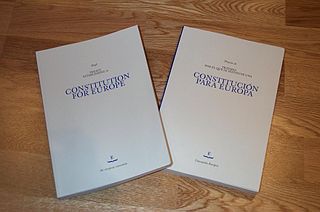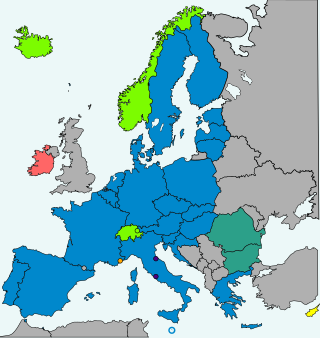
The Council of the European Union, often referred to in the treaties and other official documents simply as the Council, and informally known as the Council of Ministers, is the third of the seven Institutions of the European Union (EU) as listed in the Treaty on European Union. It is one of two legislative bodies and together with the European Parliament serves to amend and approve or veto the proposals of the European Commission, which holds the right of initiative.

The European Economic Community (EEC) was a regional organisation created by the Treaty of Rome of 1957, aiming to foster economic integration among its member states. It was subsequently renamed the European Community (EC) upon becoming integrated into the first pillar of the newly formed European Union (EU) in 1993. In the popular language, the singular European Community was sometimes inaccurately used in the wider sense of the plural European Communities, in spite of the latter designation covering all the three constituent entities of the first pillar. The EEC was also known as the European Common Market (ECM) in the English-speaking countries, and sometimes referred to as the European Community even before it was officially renamed as such in 1993. In 2009, the EC formally ceased to exist and its institutions were directly absorbed by the EU. This made the Union the formal successor institution of the Community.

The European Parliament (EP) is one of the two legislative bodies of the European Union and one of its seven institutions. Together with the Council of the European Union, it adopts European legislation, following a proposal by the European Commission. The Parliament is composed of 720 members (MEPs), after the June 2024 European elections, from a previous 705 MEPs. It represents the second-largest democratic electorate in the world, with an electorate of around 375 million eligible voters in 2024.

The Treaty on European Union (2007) is one of the primary Treaties of the European Union, alongside the Treaty on the Functioning of the European Union (TFEU). The TEU forms the basis of EU law, by setting out general principles of the EU's purpose, the governance of its central institutions, as well as the rules on external, foreign and security policy.

Parliamentary procedures are the accepted rules, ethics, and customs governing meetings of an assembly or organization. Their object is to allow orderly deliberation upon questions of interest to the organization and thus to arrive at the sense or the will of the majority of the assembly upon these questions. Self-governing organizations follow parliamentary procedure to debate and reach group decisions, usually by vote, with the least possible friction.

The Schengen Agreement is a treaty which led to the creation of Europe's Schengen Area, in which internal border checks have largely been abolished. It was signed on 14 June 1985, near the town of Schengen, Luxembourg, by five of the ten member states of the then European Economic Community. It proposed measures intended to gradually abolish border checks at the signatories' common borders, including reduced-speed vehicle checks which allowed vehicles to cross borders without stopping, allowing residents in border areas freedom to cross borders away from fixed checkpoints, and the harmonisation of visa policies.

The Treaty establishing a Constitution for Europe was an unratified international treaty intended to create a consolidated constitution for the European Union (EU). It would have replaced the existing European Union treaties with a single text, given legal force to the Charter of Fundamental Rights, and expanded qualified majority voting into policy areas which had previously been decided by unanimity among member states.

The Treaty of Amsterdam, officially the Treaty of Amsterdam amending the Treaty on European Union, the Treaties establishing the European Communities and certain related acts, was signed on 2 October 1997, and entered into force on 1 May 1999; it made substantial changes to the Treaty of Maastricht, which had been signed in 1992.

A European political party, known formally as a political party at European level and informally as a Europarty, is a type of political party organisation operating transnationally in Europe and within the institutions of the European Union (EU). They are regulated and funded by EU Regulation 1141/2014 on the statute and funding of European political parties and European political foundations, and their operations are supervised by the Authority for European Political Parties and European Political Foundations (APPF).

The institutions of the European Union are the seven principal decision-making bodies of the European Union and the Euratom governed under the Treaties of the European Union and European Union law. They are, as listed in Article 13 of the Treaty on European Union:

The political structure of the European Union (EU) is similar to a confederation, where many policy areas are federalised into common institutions capable of making law; the competences to control foreign policy, defence policy, or the majority of direct taxation policies are mostly reserved for the twenty-seven state governments. These areas are primarily under the control of the EU's member states although a certain amount of structured co-operation and coordination takes place in these areas. For the EU to take substantial actions in these areas, all Member States must give their consent. Union laws that override State laws are more numerous than in historical confederations; however, the EU is legally restricted from making law outside its remit or where it is no more appropriate to do so at a state or local level (subsidiarity) when acting outside its exclusive competences. The principle of subsidiarity does not apply to areas of exclusive competence.

The European Union adopts legislation through a variety of legislative procedures. The procedure used for a given legislative proposal depends on the policy area in question. Most legislation needs to be proposed by the European Commission and approved by the Council of the European Union and European Parliament to become law.
European Union (EU) concepts, acronyms, and jargon are a terminology set that has developed as a form of shorthand, to quickly express a (formal) EU process, an (informal) institutional working practice, or an EU body, function or decision, and which is commonly understood among EU officials or external people who regularly deal with EU institutions.

The Treaty of Lisbon is an international agreement that amends the two treaties which form the constitutional basis of the European Union (EU). The Treaty of Lisbon, which was signed by all EU member states on 13 December 2007, entered into force on 1 December 2009. It amends the Maastricht Treaty (1992), known in updated form as the Treaty on European Union (2007) or TEU, as well as the Treaty of Rome (1957), known in updated form as the Treaty on the Functioning of the European Union (2007) or TFEU. It also amends the attached treaty protocols as well as the Treaty establishing the European Atomic Energy Community (EURATOM).
The Mechanism for Cooperation and Verification (CVM) was a safeguard measure invoked by the European Commission when a new member or acceding state of the European Union failed to implement commitments undertaken in the context of the accession negotiations in the fields of the Area of freedom, security and justice or internal market policy. The European Commission has decided to not use CVM anymore. Instead, the Commission expects every new member to join the EU without deficiencies that would require special monitoring.

The Agriculture and Fisheries Council (AGRIFISH) is one of the configurations of the Council of the European Union and is composed of the agriculture and fisheries ministers of the 27 European Union member states. Its competencies include the Common Agricultural Policy (CAP) and the Common Fisheries Policy (CFP), among others.

The Single Resolution Mechanism (SRM) is one of the pillars of the European Union's banking union. The Single Resolution Mechanism entered into force on 19 August 2014 and is directly responsible for the resolution of the entities and groups directly supervised by the European Central Bank as well as other cross-border groups. The centralised decision making is built around the Single Resolution Board (SRB) consisting of a chair, a Vice Chair, four permanent members, and the relevant national resolution authorities.
Primary legislation and secondary legislation are two forms of law, created respectively by the legislative and executive branches of governments in representative democracies. Primary legislation generally consists of statutes, also known as 'acts', that set out broad principles and rules, but may delegate specific authority to an executive branch to make more specific laws under the aegis of the principal act. The executive branch can then issue secondary legislation, creating legally enforceable regulations and the procedures for implementing them.

The Schengen acquis is a set of rules and legislation, integrated into European Union law, which regulate the abolition of border controls at the internal borders within the Schengen Area, as well as the strengthening of border controls at the external borders.

Article 7 of the Treaty on European Union is a procedure in the treaties of the European Union (EU) to suspend certain rights from a member state. While rights can be suspended, there is no mechanism to expel a state from the union.









